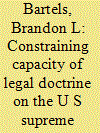| Srl | Item |
| 1 |
ID:
090830


|
|
|
|
|
| Publication |
2009.
|
| Summary/Abstract |
Does law exhibit a significant constraint on Supreme Court justices' decisions? Although proponents of the attitudinal model argue that ideology predominantly influences justices' choices, "hybrid models" posit that law and ideology exhibit discrete and concurrent effects on justices' choices. I offer a new conceptualization of legal constraint examining how legal rules permit varying degrees of ideological discretion, which establishes how strongly ideological preferences will influence justices' votes. In examining the levels-of-scrutiny legal doctrine, I posit theoretical models highlighting the differential constraining capacities of the strict scrutiny, intermediate scrutiny, and rational basis rules. I use a multilevel modeling framework to test the hypotheses within the context of the Grayned doctrine in free expression law. The results show that strict scrutiny, which Grayned applied to content-based regulations of expression, significantly constrains ideological voting, whereas intermediate scrutiny (applied to content-neutral regulations) and the low scrutiny categories each promote high levels of ideological voting.
|
|
|
|
|
|
|
|
|
|
|
|
|
|
|
|
| 2 |
ID:
119449


|
|
|
|
|
| Publication |
2013.
|
| Summary/Abstract |
This article explores the transition from revolutions to constitutions in Egypt. In order to understand the current transition, the article compares events since 2011 to the 1919 constitutional revolution and the 1952 Free Officers' Movement.
In comparing these three revolutionary periods and the constitutions they produced, the article makes two overarching claims: first, a constitution does not arise from the fiat of wise lawgivers or experts in the rule of law. Rather, it emerges from a contentious political process in which competing agents and institutions seek to promote their own interests. This competitive process, however, is actually beneficial to constitution-making, constitutional politics and political life more widely.
Second, the article highlights that while the political dynamics of constitution-making in Egypt reveal domestic politics, the process of constitution-making also demonstrates how such dynamics take place in a global political context. Together, these two claims point up that constitutionalism is just as much a political movement as a legal doctrine.
|
|
|
|
|
|
|
|
|
|
|
|
|
|
|
|